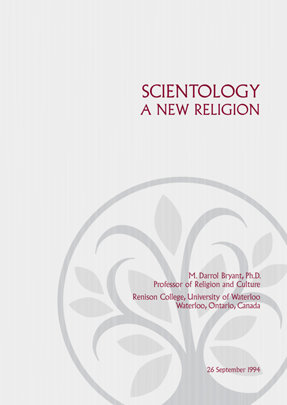
-
HOME
-
WHAT IS STANDOur Mission Our Values Our Help Contact
-
WHAT WE FIGHT FORReligious Freedom Religious Literacy Equality & Human Rights Inclusion & Respect Free Speech Responsible Journalism Corporate Accountability
-
RESOURCESExpert Studies Landmark Decisions White Papers FAQs David Miscavige Religious Freedom Resource Center Freedom of Religion & Human Rights Topic Index Priest-Penitent Privilege Islamophobia
-
HATE MONITORBiased Media Propagandists Hatemongers False Experts Hate Monitor Blog
-
NEWSROOMNews Media Watch Videos Blog
-
TAKE ACTIONCombat Hate & Discrimination Champion Freedom of Religion Demand Accountability

Scientology: A New Religion
BY M. DARROL BRYANT, PH.D., DEPARTMENT OF RELIGIOUS STUDIES, RENISON COLLEGE, UNIVERSITY OF WATERLOO, ONTARIO, CANADA
Synopsis:
In this article, originally published in 1999, Professor M. Darrol Bryant presents an analysis and review of Scientology as a new religion in its historical, social, cultural and, of course, theological contexts. This includes comparisons with other religions, namely Buddhism and Christianity. Specifically, Dr. Bryant addresses two questions: (1) Is Scientology a religion? and (2) Are Scientology Churches places of worship? In both instances he concludes in the affirmative, based on a nuanced analysis that displays familiarity with Scientology theology, literature written by other scholars and definitions of religion: “In light of this review of Scientology in relation to the elements of the modern scientific definition of religion, it is apparent that Scientology is a religion. It has its own distinctive beliefs in and account of an unseen, spiritual order, its own distinctive religious practice and ritual life, it has its own authoritative texts and community-building. … In the light of this review of Scientology practice and activity, I conclude that Scientology does engage in worshipping activity, as worship is understood in the modern study of religion, in their places of worship. The activities of Scientologists in their places of worship fall into the range of patterns and practices found within the religious life of humankind.” These places of worship consist of over 11,000 Churches, missions and affiliated groups in nations all over the world, with new Churches regularly opening to provide services to all of humanity—whether that be through Dianetics, Scientology or global social betterment and humanitarian programs.

